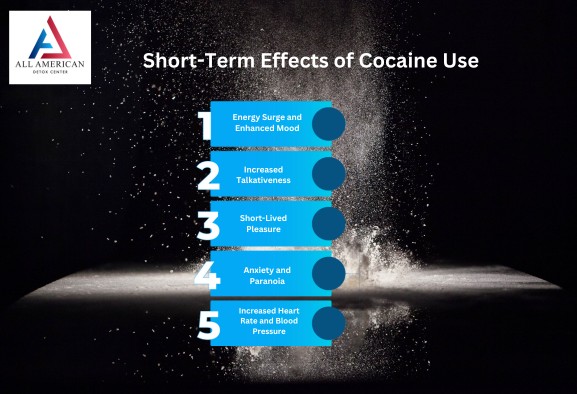In the realm of substance abuse, Cocaine has long been a subject of fascination and concern. As a leading authority on addiction, we delve into the intricacies surrounding this powerful stimulant to provide you with a comprehensive understanding.
Let’s explore the questions many individuals have: Is Cocaine addictive? What exactly is Cocaine, and how does it differ from crack Cocaine?
Join us as we uncover the short-term effects of Cocaine use, the stages of Cocaine addiction, and the nuanced approach to Cocaine addiction treatment at All American Detox.
What is Cocaine?
Cocaine operates by increasing levels of dopamine, a neurotransmitter associated with pleasure and reward, in the brain. The rapid onset of euphoria and heightened energy makes it a sought-after recreational substance. However, this euphoria is short-lived and often followed by a ‘crash,’ leading many to seek repeated use.
What is Crack Cocaine?
Crack Cocaine, a potent and crystalline form of the drug, is created by mixing powder Cocaine with baking soda and water and then heating the mixture. The result is small, crackling crystals, which are smoked for a rapid and intense high. This form of Cocaine is highly addictive due to its immediate and severe effects on the brain.
What Are Some Short-Term Effects of Cocaine Use?

Energy Surge and Enhanced Mood:
One of the hallmark short-term effects of Cocaine use is the sudden surge of energy and euphoria. Users often report feeling invincible, hyper-alert, and intensely focused. This heightened arousal contributes to a sense of well-being and confidence, attracting individuals to the drug’s alluring effects.
Increased Talkativeness:
Cocaine’s influence extends to social behavior, with users commonly experiencing a notable increase in talkativeness. Communication barriers seem to dissolve as individuals become more animated, engage in prolonged conversations, and express thoughts with heightened enthusiasm.
Hypersensitivity to Stimuli:
The stimulant properties of Cocaine lead to heightened sensitivity to external stimuli. Colors appear more vivid, sounds become sharper, and tactile sensations intensify. This hyperstimulation contributes to the overall sensory experience users seek, creating a temporary escape from the mundane.
Short-Lived Pleasure:
While the initial effects of Cocaine are undeniably pleasurable, they are also notoriously short-lived. The ‘high’ experienced by users is swiftly followed by what is commonly known as the ‘crash.’ This abrupt shift in mood brings about feelings of fatigue, irritability, and a profound sense of unease.
Increased Heart Rate and Blood Pressure
The stimulant nature of Cocaine has physiological implications, manifesting in an increased heart rate and elevated blood pressure. These effects can pose serious risks, particularly for individuals with pre-existing cardiovascular conditions. The strain on the heart and circulatory system is a critical concern during episodes of Cocaine use.
Constricted Blood Vessels and Dilated Pupils
The drug’s impact on the circulatory system includes the constriction of blood vessels. This vasoconstriction, coupled with the dilation of pupils, contributes to the characteristic physical signs associated with Cocaine use. These visual cues can be indicative of recent drug ingestion.
Anxiety and Paranoia
As the effects of Cocaine wear off, users often experience heightened anxiety and, in some cases, paranoia. The crash, coupled with the depletion of neurotransmitters, can result in a profound emotional low, leading to a cycle of cravings and subsequent use to alleviate negative emotions.
What are Some Stages of Cocaine Addiction?
Experimentation:
The initial stage involves experimentation, where individuals try Cocaine for the first time. This phase is often marked by curiosity, peer influence, or a desire for novel experiences. The initial encounter with the drug may lead to heightened sensations, creating a potential gateway to regular use.
Regular Use:
As experimentation transitions into regular use, the individual begins incorporating Cocaine into their routine. The desire for the drug increases, driven by the pursuit of euphoria and temporary escape from reality. The frequency of use escalates, laying the groundwork for developing tolerance.
Tolerance Development:
With continued use, the body adapts to the presence of Cocaine, leading to the development of tolerance. Individuals find that they need increasing amounts of the drug to achieve the same effects experienced during the initial stages. This heightened tolerance often serves as a red flag for the potential progression toward dependency.
Dependency:
The stage of dependency is characterized by the reliance on Cocaine to function “normally.” Physical and psychological dependence takes root, and individuals may experience cravings, irritability, and mood swings when not using the drug. Breaking free from the grip of dependency becomes increasingly challenging.
Addiction:
The pinnacle of the Cocaine addiction journey is full-blown addiction. At this stage, individuals lose control over their use despite negative consequences. Social, occupational, and personal aspects of life are significantly impacted as the pursuit of Cocaine becomes the primary focus. Health deteriorates, relationships suffer, and the individual’s overall well-being is compromised.
Cocaine Addiction Treatment At All-American Detox
At All American Detox, our commitment to providing unparalleled care extends to individuals grappling with Cocaine addiction. Recognizing the unique challenges posed by this formidable addiction, our tailored treatment approach integrates medical expertise, psychological support, and a compassionate environment to foster lasting recovery.
We at All American Detox, dedicated to excellence in Cocaine addiction treatment, are unwavering. By combining medical expertise, personalized care, and a holistic approach, we empower individuals to embark on lasting recovery.
Conclusion
The question “Is Cocaine addictive?” is answered with a resounding yes. The allure of euphoria and energy can quickly spiral into a cycle of addiction, especially with the highly potent form of crack Cocaine. Understanding the short-term effects, stages of addiction, and available treatments is pivotal in addressing this complex issue.


